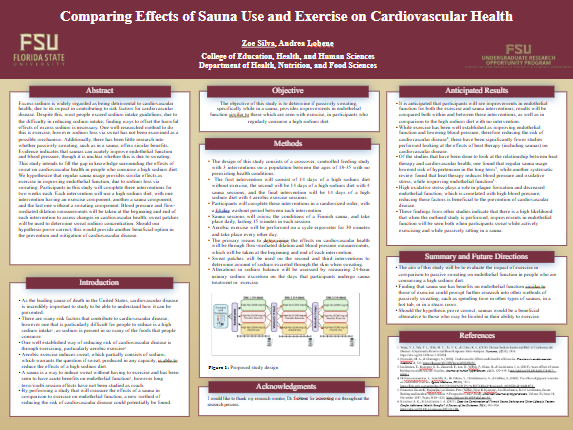Research Symposium
25th annual Undergraduate Research Symposium, April 1, 2025
Zoe Silva Poster Session 2: 10:45 am - 11:45 am/ Poster #19

BIO
I am a second year dietetics student from the Greater Philadelphia Area. My passion for dietetics stems from an interest in understanding how nutrition can be optimized for better health and fitness, as well as the concept of nutrition and food as medicine. This passion has led me to engage in research at FSU where I have been able to work in a nutrition lab focusing on cardiovascular health. After graduating from FSU I intend to pursue continued education with the end goal of becoming a registered dietitian.
Comparing Effects of Sauna Use and Exercise on Cardiovascular Health
Authors: Zoe Silva, Andrea LobeneStudent Major: Dietetics
Mentor: Andrea Lobene
Mentor's Department: Department of Health, Nutrition, and Food Sciences Mentor's College: College of Education, Health, and Human Science Co-Presenters:
Abstract
Excess sodium is widely regarded as being detrimental to cardiovascular health, due to its impact in contributing to risk factors for cardiovascular disease. Despite this, most people exceed sodium intake guidelines, due to the difficulty in reducing sodium intake; finding ways to offset the harmful effects of excess sodium is necessary. One well researched method to do this is exercise, however sodium loss via sweat has not been examined as a possible mechanism. Additionally, there has been little research into whether passively sweating, such as in a sauna, offers similar benefits. Evidence indicates that saunas can acutely improve endothelial function and blood pressure, though it is unclear whether this is due to sweating. This study intends to fill the gap in knowledge surrounding the effects of sweat on cardiovascular health in people who consume a high sodium diet. We hypothesize that regular sauna usage provides similar effects as exercise in improving endothelial function, due to sodium loss via sweating. Participants in this study will complete three interventions for two weeks each. Each intervention will use a high sodium diet, with one intervention having an exercise component, another a sauna component, and the last one without a sweating component. Blood pressure and flow-mediated dilation measurements will be taken at the beginning and end of each intervention to assess changes in cardiovascular health; sweat patches will be used to determine sweat sodium concentration. Should our hypothesis prove correct, this would provide another beneficial option in the prevention and mitigation of cardiovascular disease.
Keywords: Nutrition, Health Sciences, Exercise


